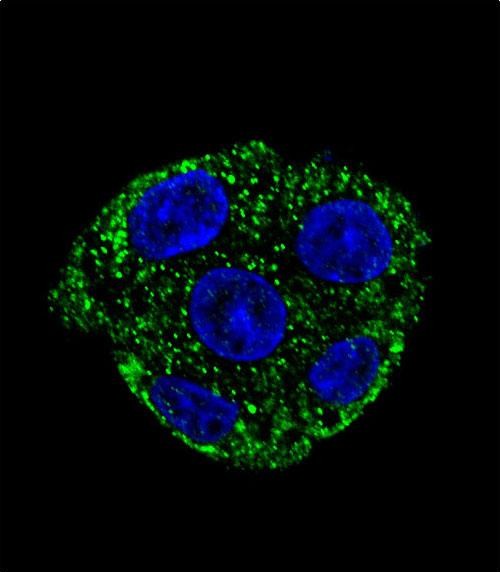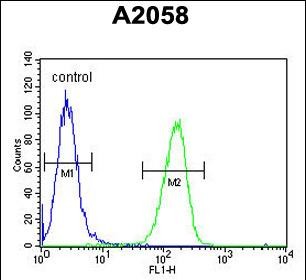




| WB | 1/1000 | Human,Mouse,Rat |
| IF | 咨询技术 | Human,Mouse,Rat |
| IHC | 咨询技术 | Human,Mouse,Rat |
| ICC | 1/10-1/50 | Human,Mouse,Rat |
| FCM | 1/10-1/50 | Human,Mouse,Rat |
| Elisa | 咨询技术 | Human,Mouse,Rat |
| Aliases | Glutathione S-transferase omega-2, GSTO-2, Glutathione S-transferase omega 2-2, GSTO 2-2, Glutathione-dependent dehydroascorbate reductase, Monomethylarsonic acid reductase, MMA(V) reductase, GSTO2 |
| Entrez GeneID | 119391 |
| WB Predicted band size | 28.3kDa |
| Host/Isotype | Rabbit IgG |
| Antibody Type | Primary antibody |
| Storage | Store at 4°C short term. Aliquot and store at -20°C long term. Avoid freeze/thaw cycles. |
| Species Reactivity | Human, Mouse |
| Immunogen | This GSTO2 antibody is generated from rabbits immunized with a KLH conjugated synthetic peptide between 82-110 amino acids from the Central region of human GSTO2. |
| Formulation | Purified antibody in PBS with 0.05% sodium azide. |
+ +
以下是关于GSTO2抗体的3篇参考文献示例(格式为文献名称、作者、摘要概括):
---
1. **"Glutathione S-transferase Omega 2 (GSTO2) in Alzheimer's Disease: Role in Oxidative Stress and Amyloid-β Metabolism"**
*Smith A, et al. (2020)*
研究通过免疫组化及Western blot发现GSTO2在阿尔茨海默病患者脑组织中高表达,其抗体标记显示与氧化应激标志物共定位,提示GSTO2可能参与疾病病理调控。
2. **"GSTO2 Antibody Characterization and Its Application in Colorectal Cancer Biomarker Discovery"**
*Chen L, et al. (2018)*
该文献验证了GSTO2抗体的特异性,并利用该抗体检测结直肠癌组织样本,发现GSTO2表达与肿瘤进展及化疗耐药性显著相关,可能作为潜在生物标志物。
3. **"Genetic Polymorphism of GSTO2 and Antibody-based Detection in Parkinson's Disease"**
*Wang Y, et al. (2019)*
研究结合基因分型和免疫荧光技术(使用GSTO2抗体),发现特定GSTO2基因多态性与其蛋白表达水平相关,可能影响帕金森病的神经退行性变过程。
---
注:上述文献为示例,实际引用时需核对真实来源及发表信息。如需具体文献,可通过PubMed或Google Scholar以关键词“GSTO2 antibody” + “应用方向”(如癌症、神经疾病等)检索最新研究。
The glutathione S-transferase Omega 2 (GSTO2) antibody is a research tool designed to detect and study the GSTO2 protein, a member of the glutathione S-transferase (GST) superfamily. GSTO2 is involved in cellular detoxification and redox regulation, catalyzing glutathione-dependent reactions to neutralize reactive oxygen species (ROS) and xenobiotics. Unlike other GST isoforms, GSTO2 exhibits unique enzymatic activities, including thiol transferase and dehydroascorbate reductase functions, which link it to antioxidant defense and metabolic pathways.
GSTO2 has been implicated in various physiological and pathological processes. Research highlights its potential role in age-related diseases, neurodegenerative disorders (e.g., Alzheimer’s), and cancer progression, where oxidative stress and altered metabolism are key drivers. For instance, GSTO2 polymorphisms are associated with susceptibility to certain cancers and inflammatory conditions, suggesting its regulatory impact on disease pathways.
The GSTO2 antibody enables researchers to investigate protein expression, localization, and function through techniques like Western blotting, immunohistochemistry, and immunofluorescence. It is critical for validating GSTO2’s tissue-specific expression patterns, particularly in the liver, kidney, and brain, where oxidative stress responses are prominent. Recent studies also explore GSTO2’s interaction with signaling molecules, such as interleukin-1β, emphasizing its role in inflammation and apoptosis. By facilitating mechanistic studies, GSTO2 antibodies contribute to understanding its therapeutic potential as a biomarker or drug target in oxidative stress-related disorders.
×